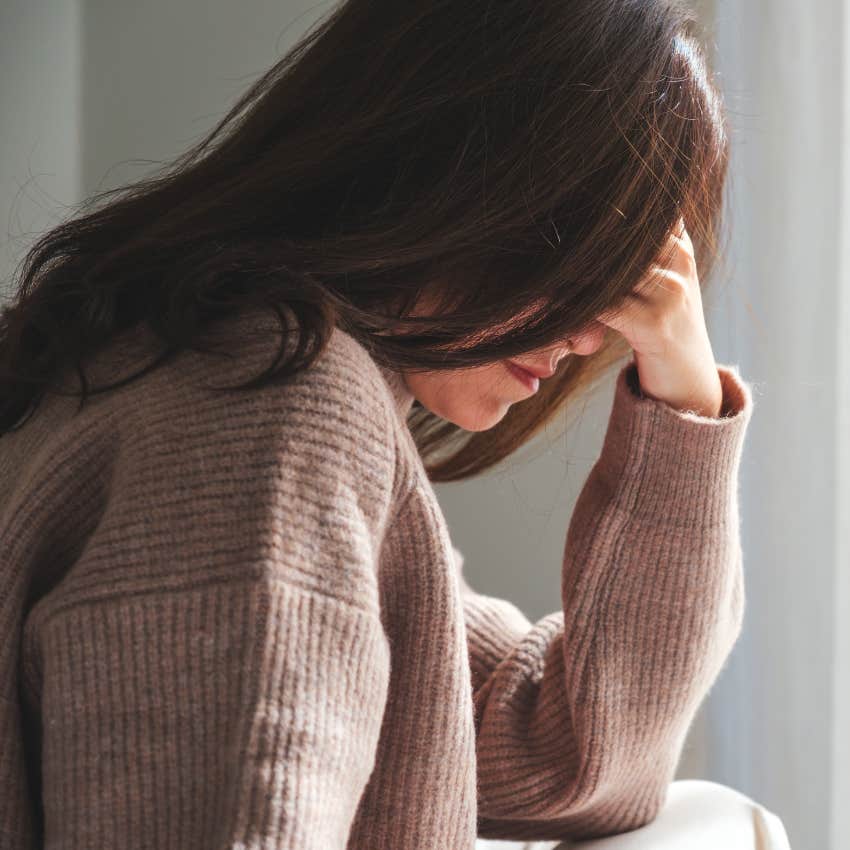If You Love Someone With Depression, Please Read These 10 Things I’ve Been Too Tired To Say
Loving someone with depression is hard, but being the one who's struggling is even harder.
 Ali Soleymani | Unsplash
Ali Soleymani | Unsplash People struggling with depression often wish that others showed more understanding towards their illness. Unfortunately, depression is still surrounded by stigma and ignorance.
A 2023 study explained that this lack of understanding can exacerbate feelings of loneliness and isolation and even lead individuals to avoid social interactions due to fear of judgment. With that being said, here are some things people suffering from depression wish you knew about what depression feels like.
If you love someone with depression, please read these ten things I’ve been too tired to say:
1. 'We're not lazy'
Almost half of the U.S. population believes depressed people are lazy, despite the evidence that depression is a mental illness with a biological basis. One of the most common definitions of depression is a state of low mood with an aversion to activity.
Depressed people find it hard to do normal activities, which makes them come off as lazy. However, what you didn't know is that most depressed people feel a great deal of guilt as a result of their inability to get things done.
2. 'We can't just snap out of it'
 Perfect Wave / Shutterstock
Perfect Wave / Shutterstock
Oftentimes, people with depression are told that they should snap out of it by using their willpower. However, we need to keep in mind that for a person to have a will in the first place, they need to have adequate levels of the feel-good neurotransmitter serotonin in the brain, the neurotransmitter whose levels are below normal in the depressed brain.
So, telling a depressed person to snap out of it is the equivalent of telling an asthma sufferer to just get over it.
3. 'We’re not looking for attention'
Sometimes, depressed people may act out as a result of their mental state. This is especially true for men. Studies show that men are more likely to engage in risk-taking, substance abuse, and escapist behavior when depressed.
These behaviors are believed to serve as a cover-up mechanism to hide vulnerability and to escape one’s feelings. Keeping these facts in mind will help you understand that the depressed person is not acting out to gain attention but to get out of their misery.
4. 'We don’t choose to become depressed'
Depression is often a reaction to a major life stressor. However, not everyone reacts to stress by becoming depressed. This is mostly determined by our coping mechanisms, and our coping mechanisms are determined by our upbringing, personality, and genetics.
These are things that we can’t control. So, the reason why some people become depressed and others don’t has nothing to do with life circumstances.
5. 'We need a good listener'
Chances are, when you listen to someone with depression and they tell you how they feel, you feel the need to share advice. However, advice is not what the depressed person needs from you.
After all, they get plenty of advice from their therapist. Instead, mental health resources recommend being a good listener. Showing empathy and kindness towards the depressed person can be a refreshing experience for them.
6. 'Depression is a real illness'
There seems to be a lot of skepticism surrounding mental illness, even among mental health experts. Truth be told, we still don’t understand much about mental health and the human psyche, for that matter.
However, what we do know is that depression is maladaptive, causes the person excessive suffering, and can, if left untreated, lead to suicide, which are reasons enough to look at depression as a pathological state.
7. 'Depression is not a sign of weakness'
 Farknot Architect / Shutterstock
Farknot Architect / Shutterstock
Depressed persons are often stigmatized as having a character flaw or being weak in some way. The truth is that depression can affect anyone regardless of their social status, age, gender, or personality. Depression affected around 6.7 percent of U.S. adults last year. Depression can affect anyone, anytime, anywhere.
8. It’s not you, it’s me
One of the hallmarks of depression is avoidance behavior. Procrastination, rumination, and avoiding social situations are common themes of a depressed person’s life. Although it can be easy to jump to conclusions when a depressed loved one seems to avoid meeting up with you.
Remember that this is a symptom of their illness. The same goes true for intimate relationships, as depression can take quite a toll on a person’s libido.
9. Sadness is not the same as depression
And neither is depression simple sadness. Some researchers believe that society simply tends to over-medicalize normal human experiences. While this may be true to an extent, we also need to keep in mind that true depression is neither normal nor healthy.
10. We need empathy
Depression makes a person feel lonely, empty, and their outlook on life is generally pessimistic. Showing empathy and understanding can replace these feelings with hope and optimism more than you think. So, if you feel the urge to judge, resist it and try to understand that this person’s suffering is real, although seemingly illogical.
Depression is a controversial illness subjected to a great deal of social stigma. Those affected may be discouraged as a result to seek help. This is unfortunate because depression is highly treatable with antidepressants, therapy, and even natural remedies.
If you or somebody that you know is experiencing a mental health crisis, there is a way to get help. Call SAMHSA’s National Helpline at 1-800-662-HELP (4357) or text "HELLO" to 741741 to be connected with the Crisis Text Line.
Donna Begg is an expert editor, researcher, and analyst affiliated with Consumer Health Digest, where she works with beauty and health experts.

